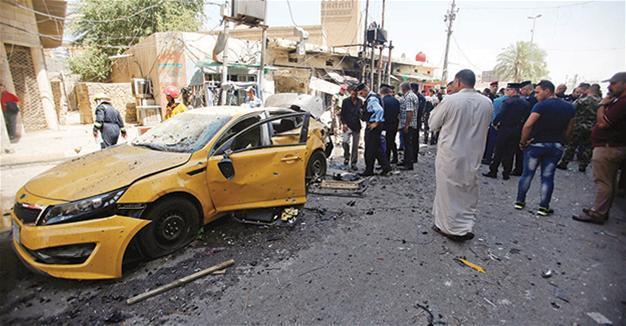Baghdad blasts kill 27 as Iraq forces battle ISIL in Mosul

Suicide bombings claimed by the Islamic State of Irap and the Levant (ISIL) killed at least 27 people in Baghdad, officials said yesterday, as Iraqi forces fight to retake the last jihadist-held areas in Mosul.
In the deadliest of the two attacks, a suicide bomber detonated an explosives-rigged vehicle at a popular ice cream shop at around midnight, killing at least 16 people and wounding 75.
The bomber struck just days after the start of the holy Muslim fasting month of Ramadan, during which Iraqis often stay out late shopping or socialising after breaking their daily fast.
ISIL issued statements claiming the ice cream shop blast and a later bombing, saying both were suicide car bombings targeting members of Iraq’s Shiite Muslim majority, whom the group considers heretics.
Images and footage posted on social media showed the devastating impact of the first blast, which ripped through the crowded area around Al-Faqma ice cream shop in the Karrada district of central Baghdad, scattering rubble across the street.
One photo showed cups of ice cream scattered on the blood-stained ground.
Brett McGurk, the U.S. envoy to the international coalition fighting ISIL, condemned the attack and expressed solidarity with Iraq.
ISIL “terrorists tonight in Baghdad target children & families enjoying time together at an ice cream shop. We stand w/Iraq against this evil,” McGurk said on Twitter.
In the second attack, a suicide bomber blew up a bomb-rigged vehicle near the country’s main pension office, which is close to one of the principal bridges over the River Tigris, the Baghdad Operations Command said in a statement.
The attack killed at least 11 people and wounding at least 40, officials said.
The attacks in Baghdad come as Iraqi forces fight to retake the last IS-held areas of Mosul, a city that was the jihadist group’s most emblematic stronghold.
Iraqi forces are more than seven months into a massive operation to retake the city from IS, and have already recaptured its whole east side and much of the west.
Three neighbourhoods north of Mosul’s Old City - Al-Shifaa, Al-Saha and Al-Zinjili -- are now the target of a broad assault by Iraqi soldiers, police and special forces that was launched last week.
Yesterday, an Iraqi army officer said that security forces were proceeding slowly in Al-Shifaa in a bid to protect infrastructure.
“The problem is that it is a neighbourhood with four or five hospitals,” Brigadier General Shakir Kadhim Mohsen told AFP in Mosul, adding that forces have permission to “take more time to spare the infrastructure and keep the civilians safe”.
Mohsen said ISIL was mainly relying on “snipers and suicide bombers” to target Iraqi forces, as it is running low on mortar rounds and explosives after losing sites it previously used to produce them.
“There are 50 to 100 fighters moving from one building to another” in Al-Shifaa, he said.
The United Nations has warned that up to 200,000 civilians who are believed to remain in IS-held areas of the city are in grave danger and that large numbers could flee.
“We are deeply concerned that right now, in the last final stages of the campaign to retake Mosul, that the civilians... in (IS) areas are probably at graver risk now than at any other stage of the campaign,” Lise Grande, the UN humanitarian coordinator for Iraq, told AFP.
She said the UN estimates there are between 180,000 and 200,000 civilians in jihadist-held areas of Mosul, the majority of them in the Old City.
The area - a warren of closely spaced buildings and narrow streets - has posed a significant challenge to Iraqi forces.
Families who managed to flee IS-held areas have told the UN that food, water and medicines are in short supply and that snipers fire on civilians who try to leave, Grande said.
 Suicide bombings claimed by the Islamic State of Irap and the Levant (ISIL) killed at least 27 people in Baghdad, officials said yesterday, as Iraqi forces fight to retake the last jihadist-held areas in Mosul.
Suicide bombings claimed by the Islamic State of Irap and the Levant (ISIL) killed at least 27 people in Baghdad, officials said yesterday, as Iraqi forces fight to retake the last jihadist-held areas in Mosul.